We humans, identify ourselves as sentient beings. For that reason, we feel that we have more needs than just our biological/survival needs. This particular trait is one of the most important distinctive features between us and animals. This is what makes us human. it is important for us to organize our needs in a way that we can explain them easily.
Hierarchy is a very common approach our mind takes to organize our thoughts. Our mind Groups thoughts together and then place them in order so that we can act upon those based on what is important to us. Abraham Harold Maslow (/ˈmæzloʊ/; April 1, 1908 – June 8, 1970) was an American psychologist who was best known for creating Maslow’s hierarchy of needs, a theory of psychological health predicated on fulfilling innate human needs in priority, culminating in self-actualization. In this article, I intend to find and articulate correlations between different financial stages and the fulfillment of different human needs.

Maslow’s pyramid is already very self-explaining. In essence, he was reassuring us that we have more needs than just surviving and reproducing. Our fulfillment is subjective. Some of us will be most satisfied by just fulfilling our basic needs and for some of us, we may feel unsatisfied even when we are in the esteem stage. Why would that be the case? why different people will have different levels of need?
After achieving my Financial Independence, I have been asking myself such questions more and more. I could identify at least 3 major reasons that influence our needs. These findings are not backed by any scientific facts. These are anecdotal pieces of evidence I found through my short experience of living outside of the system.
- Society/Social Contracts.
- Education/Desire to learn.
- Financial Solvency level.
How may society influences our needs?
Here I include the family too. We are born into a family (except very few of us) and a society. We did not choose it by ourselves, it is given to us, we get what we get. It is totally our own responsibility to make the best out of what we got. Change it, Improve it, Leave it, keep living it! deal with it; however way we may want to roll.
We take it for granted but if you look into Maslow’s pyramid you will see that just being born in a family already fulfills more than basic needs. Let’s take two scenarios, where one child is born in a slum of Bangladesh and one child is born in the poorest family in Sweden. I did not choose these countries to establish any general opinion about the places. I chose these two countries because I was born in Bangladesh and currently living in Sweden; no other reasons.
Children in Poorest Family (Slums) in Bangladesh

Below is what a slum in Bangladesh looks like, you can read the following articles for more statistics https://www.thefinancialexpress.com.bd/views/slums-and-poverty-1516640099
On average, the daily earnings per capita in a slum of Bangladesh is about 108 BDT which is equal to 1.27 USD. Imagine a child is born in one of those families. What do you think about the most probable needs of that child? Are they thinking of the purpose of life?
The most common outcome is that the kid starts working as soon as possible to support his/her survival cost. Parents somehow manage to feed them and may send them to free public primary schools until they are capable to start working as a helping hand. That’s about all the luxury the kid may have. Security and health care are not given. They don’t have anything that we call childhood. In addition to that, society doesn’t expect much from them.
Oppression and exploitation is the second name of life. In short, the purpose of that kid’s life is to survive and all resources they have are just a family and a strong desire to improve. An interesting study is published on human intelligence with relation to race, social problems, and many other parameters link: https://www.intelltheory.com/ The study shows a strong correlation between poverty and lower IQ
Children in Poorest Family (refugee) in Sweden
This is what an apartment building of the poorest family in Sweden looks like, the picture is taken from a Quora article: https://www.quora.com/How-do-poor-people-live-in-Sweden. It is a little story of a Syrian refugee in Sweden. Currently, he is enrolled in various government-run employment training schemes and does internships and short jobs whenever they come up. That earns him “aktivitetsstöd”, activity support. It means that his housing and transport are covered, plus he gets something extra for food and other things.
Granted that they are not having luxury holidays, fancy cars, and other discretionary. They are provided with basic needs, safety, health, education, friends, and family.

“The family you are born into can put you in level 1 or level 3 of Maslow’s hierarchy of needs since your birth”
Zakaria Khan
How desire to learn may influences needs?
Carefully looking into the Esteem stage gives us some clues about the importance of education in life. A high level of recognition, strength, freedom requires us to have high esteem. We know that competence is confidence. The higher our competence level is in a subject matter, the more confident we are to tackle a complex problem in that matter. Successfully, resolving problems brings us respect and recognition.
We know 10,000 hours rule. This rule says that one needs to put in about 10,000 hours to become a good specialist in an area. Our time is limited on this earth thus most of us put those intense hours on a subject matter only when that is commercially beneficial. Outside of school times, it will be very hard to have dedication and discipline.
The only possible explanation is that someone has a strong desire to learn and thus puts effort to develop competence at the level to solve the most complex problems and receives respect and recognition in return. Money on its own can not trigger the desire to learn but money surely can free our time so we can put 10,000 hours in many areas and become more competent and confident. Surely that will increase our chances to reach a very high Self-Esteem stage.
In addition to the family; society also plays a big role for individuals to develop high self-esteem. We live in a connected world, constantly bombarded with news, opinions, and judgments. We often observe that when a country has a good economy and strong military they are receiving higher recognition, respect, and acceptance compared to a weaker economy and military capability. It is also observed that societies with a good economy tend to value higher stages of needs. It is likely due to the fact that they have more time to solve complex cognitive problems due to money and security.
“Desire to learn is the key factor to reach stage 4 of needs. Society plays a role too”
Zakaria Khan
How Financial Independence may shape our needs?
Financial Independence (FI) is not the same as having a lot of money. FI means that earnings from your investments are enough for you to sustain your living. Today’s Fiat Currency by itself does not add any value to our life. Money is like a very majestic tool. The utility of money depends on the holder of it. It amplifies who we are.
Money in good hands can improve lives and in wrong hands can destroy. We should not love nor hate money. Money can buy and/or give access to a large number of resources that can help us to unlock our potential. Only having a lot of money/resources will not necessarily push us towards higher needs. Desire to learn is the key to unlocking our full potential. Without that desire, lots of money will make us nothing but unproductive. Without education, lots of money may prove to be a burden.
Self-Actualisation requires us to think independently, to be critical, question everything around us, even our own existence. To be able to do that, we need to be free from the system. For example, we can not be dependent on a paycheck and question the company. The same principle applies to almost every aspect of life. Financial Independence can not only buy us time to do what we wish to do, FI can also give us the freedom to question and be curious and courageous.
“Freedom of critical thinking plays a pivotal role in self-actualization. Financial Independence can be an enabler”
Zakaria Khan
Concluding Thoughts
I leave you with some sparking thoughts. Which one do you think is the greatest achievement of the followings
- A child born in a slum yet managed to get out of poverty and make a name for him/herself at the global level.
- A child born in the poorest family in nordic and made technological break through
- A child born in rich family in Nordic and very passionate about big issues like environment
Let me know your opinion. Regardless of your answer, we shall all strive to achieve Financial Independence as soon as possible to unlock our full potential
#KhanZInvest #FinancialIndependence #FinancialEducation #psychologicalneeds #motivation
Disclaimer: I only express my point of view through this article. I could be wrong in my opinion. You should read, educate yourself to understand, and form your own opinion.




Pingback: ราวตากผ้าคอนโด
Pingback: เล่นสล็อตออนไลน์ LSM99 โบนัสแตกบ่อย แตกหนักทุกวัน
Pingback: cheap dayz hacks
Pingback: faw99
Pingback: SEO in Las Vegas
Pingback: som777
Pingback: โบท็อกราคาส่ง
Pingback: ทางเข้าpg
Pingback: gambia
Pingback: webcam tokens
Pingback: Destination Wedding in France
Pingback: taobin555
Pingback: เช่ารถตู้พร้อมคนขับ
Pingback: link
Pingback: สล็อต888 เครดิตฟรี
Pingback: เจษฏาเบท
Pingback: Info
Pingback: kc9
Pingback: pakong188
Pingback: Lsm2play เว็บพนันรวมทุกค่าย ฝากถอนไว
Pingback: สีพ่นรถยนต์
Pingback: stapelstenen
Pingback: couples massage
Pingback: Aviator bet
Pingback: https://tikn.ir/exploring-the-features-and-benefits-of-the-pocket/
Pingback: โคมไฟ
Pingback: Thai restaurant Oregon
Pingback: AZ Health Insurance Agents
Pingback: Digital Marketing Companies
Pingback: Asset Protection Planning
Pingback: AI Books for Business
Pingback: Mostbet
Pingback: ดูบอลสด888
Pingback: ติดเน็ต ais
Pingback: https://cherrycasinosweden.com/
Pingback: เว็บตรง สล็อต บาคาร่า
Pingback: valorant wallhack
Pingback: บ้านพักคนชรา
Pingback: ufabet777
Pingback: บริหารสต็อกสินค้าแบบครบวงจร
Pingback: เว็บพนันออนไลน์เกาหลี
Pingback: EV Charger
Pingback: essentials